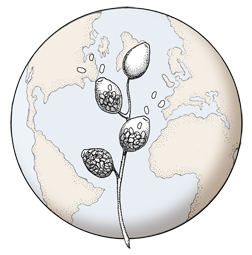Publication Type:
Journal ArticleSource:
Plant Pathology, Volume 59, p.604–612 (2010)URL:
http://dx.doi.org/10.1111/j.1365-3059.2010.02258.xKeywords:
cypress, forest pathology, root rot, soilborne pathogensAbstract:
Field observations, isolations and pathogenicity tests were performed on Austrocedrus chilensis (Cupressaceae) trees to determine the pathogenicity of Phytophthora austrocedrae and its role in the aetiology of the cypress disease mal del ciprés (MDC) in Argentina. It was found that P. austrocedrae is a primary pathogen of A. chilensis. It was isolated from large necrotic lesions in the inner bark, and superficially in the sapwood, at the root collar and stem, in most of the MDC-affected stands surveyed along the range of A. chilensis in Argentina. The main symptom in naturally infected trees was a necrotic lesion extending from killed roots up to 1 m up the tree bole. Seedlings, saplings and adult trees were all susceptible to inoculation with P. austrocedrae. Under favourable experimental conditions (flooding), inoculated seedlings suffered massive mortality in less than a month. The importance of diseases caused by Phytophthora spp. in South American forests is discussed.


